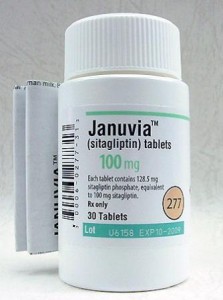 Drugs like Januvia, and other members of this class of medication, treat diabetes by acting on a hormone called Glucagon-like peptide-1 or GLP-1. While their mechanism of action is well understood, they may have dangerous side effects, as some studies have linked these drugs to an increased risk of various cancers.
Drugs like Januvia, and other members of this class of medication, treat diabetes by acting on a hormone called Glucagon-like peptide-1 or GLP-1. While their mechanism of action is well understood, they may have dangerous side effects, as some studies have linked these drugs to an increased risk of various cancers.
GLP-1 belongs to a class of hormones called incretins. These hormones help regulate the level of glucose (sugar) in the blood. The body dumps this hormone from specialized cells in the intestines whenever a person eats carbohydrates or fats. These hormones in turn trigger the release of insulin, which triggers various biochemical pathways that store this excess blood sugar.
Januvia and related drugs work by breaking down incretins such as GLP-1. This helps move blood sugar levels back to their ideal range. However, there is mounting evidence that these drugs may have a negative effect on the pancreas, and may promote pancreatic cancer.
>>Januvia Cancer Lawsuits: Learn More
There is a working hypothesis within cancer research that inflammation promotes the development of cancer. It is strongly suspected that inflammation promotes cellular turnover, which increases the chances of replication errors that could lead to cancerous changes in cells’ genetic code. According to data collected by the FDA’s Adverse Event Reporting System (AERS), these drugs are linked with a six- to 10-fold increase in the risk of pancreatitis, an inflammation of the pancreas.
According to studies based on the AERS data, these drugs are not just linked to an increased risk of pancreatitis, but actual cancers as well. This includes a 2.7-fold increase in the rate of pancreatic cancer among the users of the drug.
Researchers speculate that several different mechanisms (which are not mutually exclusive) could contribute to this. While the inflammation hypothesis remains a strong idea, it could also be a matter of the drug interfering with the immune system, allowing minor tumors, normally suppressed by the immune system, to run wild.
Pancreatic cancer is a particularly pernicious form of cancer. Most patients succumb within two years. This is because there are very few pain receptors in the pancreas, patients typically have no symptoms until the cancer has reached a very advanced stage, making it particularly hard for physicians to treat it.
Due to these concerns, dozens of Januvia cancer lawsuits have been against the drug’s manufacturers. These lawsuits seek to hold the drug makers responsible for failing to warn about the side effects of Januvia.
These Januvia cancer lawsuits have been consolidated into multidistrict litigation called In Re: Incretin-Based Therapies Products Liabilities Litigation, MDL No. 2452, in the U.S. District Court for the District of California.
In general, Januvia pancreatic cancer lawsuits are filed individually by each plaintiff and are not class actions.
Do YOU have a legal claim? Fill out the form on this page now for a free, immediate, and confidential case evaluation. The attorneys who work with Top Class Actions will contact you if you qualify to let you know if an individual lawsuit or class action lawsuit is best for you. Hurry — statutes of limitations may apply.
ATTORNEY ADVERTISING
Top Class Actions is a Proud Member of the American Bar Association
LEGAL INFORMATION IS NOT LEGAL ADVICE
Top Class Actions Legal Statement
©2008 – 2025 Top Class Actions® LLC
Various Trademarks held by their respective owners
This website is not intended for viewing or usage by European Union citizens.
Get Help – It’s Free
Join a Free Januvia, Janumet, Byetta, Victoza Cancer Class Action Lawsuit Investigation
If you or your loved one took Januvia, Victoza, Janumet or Byetta and were diagnosed with pancreatic cancer or thyroid cancer, you have a legal claim. See if you qualify by filling out the short form below.
An attorney will contact you if you qualify to discuss the details of your potential case at no charge to you.
Oops! We could not locate your form.












